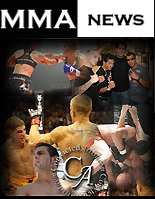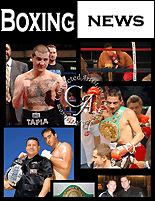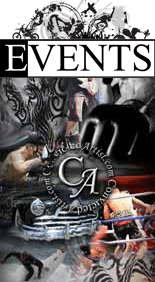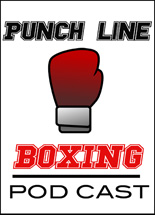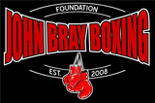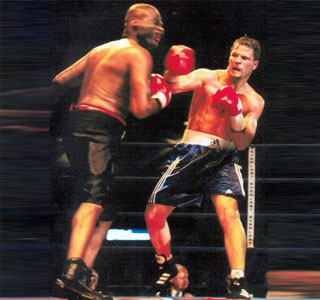
What does it take to make a fighter? That is a question that can be answered by “The Iceman” John Scully, who not only was a stand out amateur, but had a pro career that spanned thirteen years and had the former light heavyweight contender swapping leather in forty-nine professional bouts. Now the Hartford native uses his knowledge of the “sweet science” in training top professional as well as amateur fighters around the world.
Scully went toe to toe against the likes of Michael Nunn, Henry Maske and Cleveland Nelson, and has had the likes of Lawrence Clay-Bey, Chad Dawson and Matt Godfrey under his tutelage.
In this exclusive two part interview conducted by Convicted Artist Magazine, Scully talks shop about his career as a fighter, and touches base on what is going down at this time in the world of “The Iceman”, enjoy.
Benny Henderson Jr.
What was your inspiration in becoming a fighter?
John Scully
Basically, when I was a kid I did it all. I watched Muhammad Ali and Sugar Ray Leonard on TV, I read all the boxing magazines, and I read all the boxing books my father I had. By the time I was fourteen I already had read the autobiographies of Ali, Ray Robinson and Willie Pep. I used to get on my father's bed and imitate Ali or sometimes I would act out the scenes from Rocky. From there my father took me to a gym one day in 1982 and one thing led to another, I walked into the gym that day and have essentially never walked out.
BH
What was the hardest aspect for being a fighter?
JS
For me I think the two things that really stand out for me are the wait in the dressing room before a fight and the constant weight loss you have to endure leading up to fights.
People see the fight and only the fight and make their opinions and assumptions off of that but there is so much more to boxing from the boxer's standpoint. When a fight is coming up it is often a thing where every aspect of the fighters mind is consumed by that fight. Fighters are often not the easiest people to live with or get along with in the days and weeks preceding a fight.
BH
Your three most memorable fights as a professional?
JS
I loved my fight with Michael Nunn, almost every aspect of it. From the training and the sparring before hand to the walk to the ring to the actually fight right on down to the aftermath. I felt like a winner that night, definitely.
I loved fighting on TV against Alphonso Bailey early in my career because when he was the #1 amateur in the nation at 156 pounds I was still a novice amateur so he was someone I definitely looked up to back then and to fight him just a few years later was a big moment for me.
I also loved the fight with Arthur Baylis on TV. Art was a dangerous spoiler who had been in the fight of the year on "USA's Tuesday Night Fights" the year before we fought and he was one of my first fights when I moved up to light heavyweight. His size and strength definitely kept me aware and on my toes but it also pushed me to put on one of the best showings of my career, too.
BH
Taking from your experiences in your career, what advice would you give to a young fighter?
JS
I always put down my stock answer for this question and that is that at the end of the day, underneath and behind everything else involved, the one thing that matters for the fighter is that he is in the absolute best physical condition possible on fight night. Nothing else matters and it’s the only aspect of his game he can really control. He may not be the sharpest, fastest, quickest or most powerful but he can be in the best shape if he really wants to be.
BH
I know that you train fighters now, have been for a while now, which has been the hardest task, preparing for a fight yourself, or preparing your fighter for a fight?
JS
Preparing myself for fights was often tremendously difficult both physically and mentally. You go through so much as a professional fighter; sometimes it really is a case of extreme misery. As a trainer it isn't so much of a physical strain, obviously, but emotionally and mentally it's comparable. Sometimes I think there have been moments when I actually wanted a fighter of mine to win his fight more than I wanted to win some of my own and with that comes a lot of emotional and mental investment in the fighter. Just like with the fighter himself, it's not always a thing where once the fight ends you always just easily fall back into your life's normal routine. There's a recovery period, definitely.
BH
I know you are working with cruiserweight Matt Godfrey, so congrats on his latest victory. What's next for Matt?
JS
I know there could be some very big things in the works as we speak but until they announce them I can't really comment on that. I know that he is in the top five in the world by at least one sanctioning body and in the top ten of another so he's in a great position right now regardless.
BH
Who are some of the other fighters you are working with at this time, as well as the past?
JS
At this point I have four professionals and a few amateurs that I am involved with. Top ten ranked cruiserweight Matt Godfrey and former IBO 122 pound champion Mike-Mike Oliver are the two established pros I have and I also have a junior lightweight with a very strong amateur background about to turn professional on September 19 by the name of Joey "Chip" Perez. Then I also help his head trainer in the corner on fight night with up and coming featherweight prospect Matt Remillard. We spar pretty frequently and I have worked with him on his jab and his body punching over the years.
Then I am also training some amateur boxers, most notably light heavyweight named Jarin Clay-Bey, an undefeated kid who also happens to be the son of former heavyweight contender Lawrence Clay-Bey. So things are pretty busy at The Lions Den Gym in Middletown, Connecticut.
In the past I have worked closely with some good boxers, probably most notably is current light heavyweight champion Chad Dawson.
Stay tuned to Convicted Artist for the second part of this exclusive interview with “The Iceman” John Scully. For more info on “The Iceman” check out www.icemanjohnscully.com





